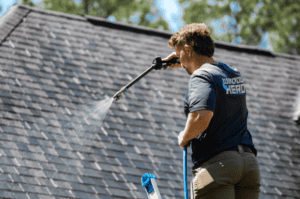How to Pressure Wash a Fence to Achieve Effective Results
In this article, we’ll walk you through everything you need to know to pressure wash your fence. From preparation and equipment setup to techniques and safety precautions, we’ve got you covered. You’ll learn how to pressure wash your fence, which will transform the overall appeal of your outdoor space.
Adequate Preparation
Before pressure washing your fence, adequate preparation is crucial to prevent damage and ensure effective cleaning. Here’s how to prepare for an effective pressure washing:
Remove or protect nearby objects
Start with observing the area where you’ll be pressure washing. We recommend removing any items that could be damaged by water or flying debris. This includes things like garden furniture, potted plants, or decorations. Cover objects that can’t be moved, such as light fixtures or electrical outlets, with a drop cloth or plastic sheet.
Setting up the pressure washer
There are two important aspects you need to consider when setting up the pressure washer:
- The right pressure: The pressure settings all depend on the type of fence material you’re working with. Check the recommended pressure settings for different fence materials in the table below:
| Fence material | Recommended pressure |
| Softwood | 500 to 800 PSI |
| Hardwood | Up to 1,300 PSI |
| Vinyl | Up to 2,000 PSI |
| Wrought iron | Up to 2,300 PSI |
- The right nozzle: Begin with a wider nozzle, such as a 25-degree or 40-degree nozzle, for a gentler wash. As you encounter stubborn stains or dirt buildup, switch to a narrower nozzle, like a 15-degree or 0-degree nozzle. Refer to this article to familiarize yourself with the different nozzle types and their respective uses.
Choosing a proper fence cleaner
Using the right detergent is essential for effectively cleaning your fence without causing damage. Use a fence cleaner specifically formulated for the material of your fence, whether it’s wood, vinyl, or metal. Check this article to learn more about fence cleaners for different fences. Apply the detergent evenly across the surface of the fence and allow it to sit for 5 to 10 minutes to loosen dirt and grime before rinsing it off with water.
Gear up
Wearing appropriate safety gear will help you protect yourself during the pressure washing process. Goggles shield your eyes from splashes and debris, while ear protection guards against the loud noise generated by the pressure washer. Prioritizing safety ensures a smooth and secure experience while cleaning your fence.
How to Pressure Wash a Fence
Learning to pressure wash a fence will help you restore its beauty and prolong its lifespan. Follow these tips for a clean and revitalized fence:
Start from the bottom up
Consider washing from the bottom of the fence and working your way up. This technique helps prevent streaking by ensuring that any dirt or grime is washed away downward rather than leaving streaks as they drip down from the top.
Work in sections
If you have a large fence, it’s best to divide it into manageable sections. Working in smaller areas lets you focus on each part thoroughly, ensuring that no spots are missed and the entire fence is cleaned.
Use a scrub brush for tough stains
For stubborn stains that refuse to budge with the pressure washer alone, consider using a scrub brush. Apply gentle pressure while scrubbing the affected areas to loosen the dirt or grime before rinsing it away with the pressure washer.
Rinse thoroughly
After pressure washing each section, be sure to thoroughly rinse it with clean water. This step helps remove any remaining detergent or loosened debris, leaving behind a clean and spot-free surface.
Time to dry
Allow the fence to dry completely before assessing the results. If you notice any areas that still appear dirty or stained, repeat the pressure washing process until you achieve the desired cleanliness.
How to Pressure Wash a Wood Fence
If you are wondering how to pressure wash a wood fence, check out these extra tips specifically for wood fences:
Use cold water
When pressure washing a wood fence, it’s good to use cold water instead of hot water. Hot water can cause the wood grain to rise, leading to premature aging and potential damage to your fence’s surface.
Use the right detergent
If you decide to use a detergent to assist with cleaning, ensure that it’s specifically designed for use on wood surfaces. Using a wood-specific detergent helps to break down dirt and grime without causing harm to the natural fibers of the wood.
Let the wood dry
After pressure washing the wood fence, allow it to dry completely before applying any stain or sealer. This ensures that the wood is free from excess moisture, allowing the stain or sealer to adhere properly and provide optimal protection and enhancement to the wood.
Is it OK to pressure wash a wood fence?
Yes, it is generally OK to pressure wash a wood fence, but it’s essential to use proper techniques to avoid damage. When pressure washing a wood fence, it’s recommended to use cold water, choose a detergent specifically designed for wood, and ensure the pressure is set within the appropriate range, typically between 500 and 1,300 PSI depending on the type of wood. Additionally, selecting the right nozzle is crucial for achieving optimal results while minimizing the risk of harm to the wood surface.
What is the best nozzle for pressure washing a wood fence?
For pressure washing a wood fence, the best nozzle option is typically the green nozzle, which provides a 25-degree spray pattern. This nozzle offers a broad range of cleaning applications and is well-suited for safely cleaning wood surfaces. Its moderate angle and pressure distribution make it effective for removing dirt and grime without causing damage to the wood.
What PSI is needed to pressure wash a wood fence?
The recommended PSI to pressure wash a wood fence depends on the type of wood. For softwood fences, such as pine or cedar, you should stay between 500 and 800 PSI. For hardwood fences, like oak or mahogany, the pressure should not exceed 1,300 PSI. Overall, it’s advised not to use pressure higher than 1,800 PSI on wooden fences to prevent potential harm to the wood fibers and surface.
How Much Does it Cost to Pressure Wash a Fence?
The cost of pressure washing a fence typically ranges from $100 to $350, but this can vary depending on several factors. The type of material, whether it’s wood, vinyl, or metal, can influence the overall cost as they may require specific cleaning methods or treatments. Also, the fence’s size plays a significant role in determining the price, as larger fences will require more time and resources to clean thoroughly.
Wrap-Up
Pressure washing your fence can rejuvenate its appearance and extend its lifespan. Adequate preparation, proper equipment, and following specific techniques are key to achieving effective results. While DIY is an option, considering the complexities involved, hiring professionals is often recommended. Experts have the expertise and equipment to ensure thorough cleaning without risking damage to the fence.


